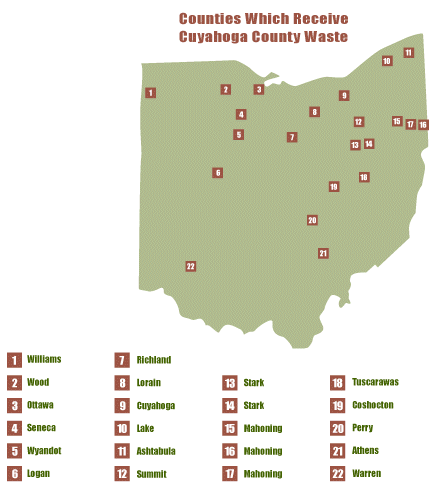| Publications |
|
| Residential Recycling | |
| Business Resources | |
| Kids Page | |
| Classroom Resources | |
| Household Hazardous Waste |
|
| District Data | |
|
• Annual Report • District News • Our Trash • Recycling Report |
|
|
Our Waste Management System Most people rarely think about their trash. And it's no wonder. Local government combined with the private sector has developed a highly complex waste management system to ensure that trash "goes away" virtually unnoticed by its generator. The fact that most of us give little thought to where our trash goes after it's set on the curb is a testament to the fact that Cuyahoga County's waste management system works. Its no small task removing trash in Cuyahoga County. Over 3.7 million tons of waste each year is generated from the county's 560,000 households, 57,000 business and institutions, and 3,300 manufacturers. This requires a lot of planning and coordination by people who must think of trash � planners, regulators, waste collectors, trucking firms, recycling companies, landfill operators, and more. All are working to make sure trash is removed efficiently and disposed safely in an age when consumption and trash production is growing. In the 1960's each person produced about 2.6 pounds of trash a day. Today, that figure has grown to 4.4 pounds a day and here in urbanized Cuyahoga County it's even higher, about 7.3 pounds a day. Much of this growth in trash is related to our economic growth � we make more, we buy more, we throw more away. And all this trash has to go somewhere.

What Happens to Our Trash?
Landfilling While landfill capacity is adequate to meet our needs, most of this capacity is located outside our county. In recent years, a number of landfills in Cuyahoga County have closed and only two public facilities remain. The closure of our in-county landfills requires us to export 95% of the waste we produce, compared to just 20% in 1995. This has increased our reliance on waste transfer stations to consolidate trash prior to shipment to disposal facilities. Our trash currently passes through ten transfer stations in the county. A consequence of exporting waste is the high cost of transferring waste from collection vehicles to long haul trailers and trucking trash to distant landfills.
Recycling & Waste Reduction Over the past ten years, communities have responded to their residents' desire to recycle by implementing curbside and drop-off recycling programs for newspaper, glass, metals, and plastics. Roughly 84% of the households in our county are serviced by community- sponsored programs. Meanwhile, commercial businesses, institutions, and manufacturers have access to numerous recycling facilities to recycle their office paper, cardboard, scrap metals, packaging materials, and plastics.
Composting
Incineration
|

 Recycling and other forms of waste reduction figure prominently into our
waste management system here in Cuyahoga County. In fact, we are among
Ohio's leaders in reducing waste, diverting 43% or 1,525,000 tons a year
from landfill disposal. A key factor in this success is the access of
county residents and business to nearly 700 recycling facilities and
programs provided by local government and private recycling companies.
Recycling and other forms of waste reduction figure prominently into our
waste management system here in Cuyahoga County. In fact, we are among
Ohio's leaders in reducing waste, diverting 43% or 1,525,000 tons a year
from landfill disposal. A key factor in this success is the access of
county residents and business to nearly 700 recycling facilities and
programs provided by local government and private recycling companies.

